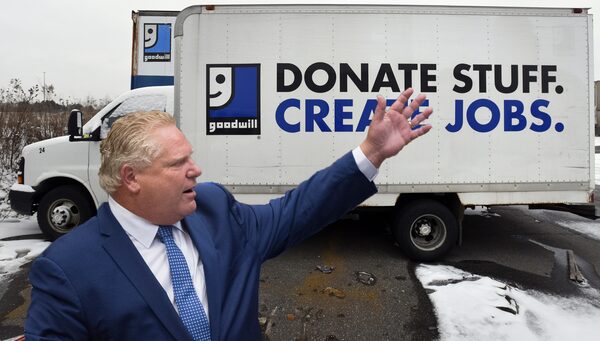Briefing highlights
- Ontario’s Ford can’t cry poor
- A Doug Ford scene I’d love to see
- Markets at a glance
- Fed raises key rate again
- Fox to sell Sky stake to Comcast
- AGF’s Goldring hands over reins
- Daimler names new CEO
We will: Put more money in your pocket and save an average household over $450 per year … Cut income taxes by 20 per cent for the second income-tax bracket, saving you up to $786 a year … Lower gasoline taxes by 10 cents a litre … Introduce a minimum-wage tax credit so those on minimum wage pay no tax … Create a 75-per-cent refundable tax credit for child care costs for children aged 0-15.
— Ontario Progressive Conservative Party’s Plan for the People
The task ahead is not an easy one. The hole is deep and it will require everyone to make sacrifices without exception.
— Ontario Finance Minister Vic Fedeli, Sept. 21
While spreads have widened slightly on the news, much of it has been well known and likely priced into the market - only about $2.9-billion of the $8.3-billion FY18/19 deficit deterioration is really ‘new news.’
— Robert Kavcic, Bank of Montreal
Ontario Premier Doug Ford can’t really cry poor and try to wiggle out of his election promises.
That doesn’t mean he won’t try.
Already, his Finance Minister, Vic Fedeli, appears to be setting the stage by warning us “the hole is deep” and we’ll have to make sacrifices based on new numbers he unveiled Friday.
And, as The Globe and Mail’s Justin Giovannetti reports, the Premier struck up a committee to probe the numbers behind what, in his eyes, is the biggest “government scandal in a generation.”
It’s hardly a deficit scandal, particularly one that should allow the young Conservative government to escape its promises.
Yes, there are some true differences from the fallen Liberal government’s last budget, and, yes, there will have to be some pullback, but the Tories have uncovered nothing they didn’t already know.
“If history is any guide, new governments get one chance to ‘blame their predecessor,’ so the bar is usually set very low to begin with,” Bank of Montreal senior economist Robert Kavcic said in a report on Ontario’s finances.
“Also, while spreads have widened slightly on the news, much of it has been well known and likely priced into the market - only about $2.9-billion of the $8.3-billion [fiscal year 2018-19] deficit deterioration is really ‘new news.’”

Ontario Premer Doug Ford (centre) sits beside Finance Minister Vic Fedeli and Deputy Premier Christine ElliottChris Young/The Canadian Press
There's a lot of noise going on here, notably accounting for pensions and a Fair Hydro Plan, according to an independent look at the books, which was a smart way for Mr. Ford to go.
This new accounting means Mr. Ford’s government faces a $15-billion deficit in the 2018-19 fiscal year, far fatter than the $6.7-billion forecast in the last Liberal budget.
But $2.7-billion relates to pension accounting, and $2.4-billion to Fair Hydro adjustments.
The rest – that’s the $2.9-billion cited by BMO’s Mr. Kavcic – is a hit to revenue and spending from factors such as lower-than-expected economic growth, the softer housing market’s impact on land transfer taxes, the effect on corporate profits from minimum-wage increases, and more.
So when you factor out the accounting, it’s a bit out of whack from the last budget. But hardly something worthy of Christine Keeler status.
Mr. Ford’s “scandal” certainly didn’t raise the eyebrows of Moody’s Investors Service, which rates the province’s debt and ran through Mr. Fedeli’s new Friday forecasts.
“Although these updates contribute to the challenges the province faces in achieving a balanced budget, as the changes largely stem from differences in accounting practices they do not materially affect our borrowing forecasts of the province, which is a key consideration of the negative outlook, and have largely already been taken into our credit consideration of the province."
Yes, we should expect some pullback.
"From a policy perspective, this budget reset will probably increase the seriousness of any looming fiscal restraint measures, while perhaps dampening the size/speed of any promised tax relief," Mr. Kavcic said.
But “from a credit perspective, it’s not clear that a more-than-doubling of the reported deficit will trigger any ratings action given that a) a meaningful portion of the change is the result of non-cash accounting treatment and b) we have yet to see how the current government will respond via a medium-term fiscal plan,” he added, estimating that the province’s borrowing needs will climb by about $4-billion beyond the originally projected $31.7-billion.
There are challenges, certainly. But not enough for Mr. Ford to not give us what he promised us.
Read more
- Justin Giovannetti: Ontario deficit at $15-billion, not previous government’s $6.7-billion forecast, say PCs
- Adam Randwanski: Doug Ford kicks at the provincial Liberals while they’re down
- Justin Giovannetti: Review calls for Ontario to reduce services, sell off assets
- Justin Giovannetti: Ford to strike committee to investigate Ontario’s fiscal situation
A scene I’d love to see

Photo illustration
Markets at a glance
Read more
More news
- Federal Reserve raises interest rates, flags end of ‘accommodative’ policy
- Janet McFarland: Luxury home sales on rebound in Toronto, Sothebys finds
- Daimler names new CEO as Zetsche to step down in 2019
- Andrew Willis: AGF’s Blake Goldring hands reins to Kevin McCreadie
- Fox agrees to sell Sky stake to Comcast
 Michael Babad
Michael Babad